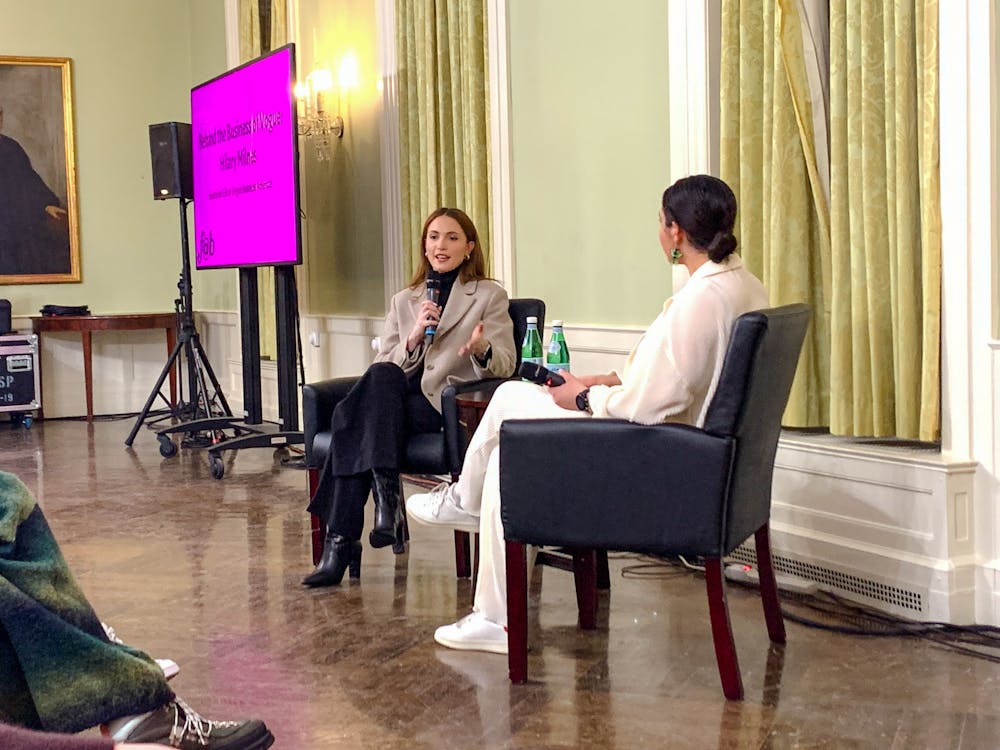Hilary Milnes, executive Americas editor of Vogue Business, kicked off Fashion@Brown’s annual Fashion Week at a panel titled “Behind the Business of Vogue.” In line with this year’s Fashion Week theme, “Fashion Beyond the Screen,” Milnes shared her experiences in fashion journalism and working at the intersection of fashion and business with students in Alumnae Hall Saturday evening.
F@B co-President Kaila Zimnavoda ’24 introduced the conversation, which was moderated by co-President Natalia Brown ’23. Recognizing that many audience members were likely interested in fashion-oriented careers, Brown began by asking Milnes about her path from covering the retail industry to becoming an executive editor at Vogue Business, a Condé Nast publication that focuses on the impact of trends and “global patterns” on the fashion industry, according to the publication’s website.
After graduating with degrees in English and journalism from Boston University, Milnes wrote for a local Boston publication before moving to focus on fashion at different publications. When Vogue Business launched out of London two years later, she reached out to one of its editors and became the new publication’s first hire in the U.S. as a feature editor, she said.
The conversation also covered the often uncertain nature of the fashion media industry, especially as the business model for journalism changes and evolves. From her own experiences covering retail, Milnes emphasized the importance of figuring out different ways to apply her own skillsets.
Working a job that deals with a more quantitative side of fashion, Milnes discussed the unique behind-the-scenes position she often finds herself in, in addition to the people-driven aspects of retail journalism that she has struggled with.
“There’s much more at play in wanting to understand the history and background of” fashion, she said. “There’s so many personalities in fashion that you need to follow and know.”
Rather than working directly within the more visible sides of the industry, Milnes said she focuses on its “nuances,” such as entertainment value and consumer decisions. Because her job also includes covering companies that are underperforming, Milnes said that it is important to keep “editorial integrity … being fair and accurate but standing behind those stories. We’re not just going to write puff pieces.”
At Vogue Business, Milnes and her team are making efforts to introduce new voices and writers who are often underrepresented in the industry, she said. Milnes noted that her favorite past project was the Vogue Business talent competitions held in the United States and United Kingdom, which provided opportunities for aspiring fashion journalists to be published in Vogue Business and meet mentors.
The conversation also touched on how fashion publications cover topics such as labor laws and sustainability. Milnes discussed her team’s initiatives to spotlight those who work in fashion manufacturing when covering sustainability. “We want to make sure we’re challenging (these problems) … actually backing up and hopefully pushing them in the right direction,” she said.
“I really enjoyed how nice (Milnes) was and … how she took us back to her college experience as well, which was something that I could relate to,” said Cecilia Sarantopoulos ’23.5, who attended the panel for inspiration.
Kyra Haddad ’23 said she “liked how relatable (the conversation) was” in terms of the trends and concepts Milnes talked about, such as sustainability and the launching and management of new brands.
Geneva Bass ’25 noted she attended the panel due to her interest in artistic industries and the businesses that drive them. “This panel allowed me to be able to get a peek into the fashion industry as a whole,” she said. “I enjoyed the intimacy of the conversation.”
In response to an audience question about building and maintaining human relationships in the fashion industry, Milnes emphasized the importance of being confident when working on the editorial side of fashion. “It can be very intimidating,” she said. “But it’s a matter of (thinking) ‘I deserve to be here’ and just putting yourself out there.”
Isabel Hahn is an Arts & Culture editor who concentrates in English and Behavioral Decision Sciences. In her free time, she enjoys watching movies, reading, and journaling.





